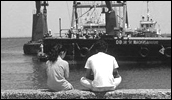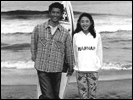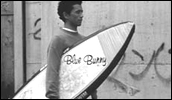A Scene at the Sea
- Year
- 1991
- Original title
- Ano Natsu Ichiban Shizuku na Umi
- Japanese title
- あの夏、いちばん静かな海
- Director
- Cast
- Running time
- 101 minutes
- Published
- 20 March 2001



by Jasper Sharp
On a thematic level, auteur theory almost goes straight out the window as far as Takeshi Kitano is concerned. For much of the 1990s the ambassador for Japan on the international cinema scene, thanks to his revisionary takes on the yakuza genre (Sonatine, 1993; Hana-Bi, 1997; et al), this film and the unrelenting slapstick mayhem of Getting Any? (Minna Yatteruka, 1994) threw his body of (cinematic) work into a completely different light.
However, the lyrical A Scene at the Sea (its Japanese title translates rather more poetically as That Summer, A Most Quiet Ocean) does bear all the hallmarks of the director, with its pared-down approach to storytelling and its subtle use of editing - the first time Kitano took over this particular role on his own films.
Deaf and dumb teenager Shigeru (Maki) leads a drudgerous life as a dustman by day. After picking up a discarded surfboard on his rounds he finds himself drawn to the waves accompanied by his doting girlfriend, the equally mute Takako (Oshima). Initially ridiculed by the local surfing clique, he spends his every spare hour trying to master the sea until his determination eventually catches the eye of the owner of a nearby surf shop who persuades him to enter a local contest. His first attempt at competition is scuppered when he fails to hear the announcement for his category. However, his unwavering perseverance begins to impress the surf crowd and very soon both he and Takako are accepted as part of the group.
Kitano's trademark minimalism here results in a film that unreels as an idyllic series of snapshot reminiscences of a perfect summer; long static bands of brightly coloured skies and azure waters broken up by sporadic flashes of bold colour in the form of the wet-suited youths basking on the beach. Due to the implicit nature of its two mute protagonists the story unfolds virtually wordlessly against the soft susurration of waves breaking against the shoreline.
Subsidiary characters are drawn in terms of their actions rather than what they say - one of the surf chicks flirts with various members of the in-crowd by getting them to peel oranges for her; Takako sits patiently on the beach folding her boyfriend's jeans; the antics of two buffoonish surf neophytes foreshadow the comic attempts of a similar duo in the director's Kids Return (1996). The eye is definitely on nuance here, and as a result each shot carries considerable pathos in its own right. The exchanged looks between Shigeru and Takako hold more emotional weight than a ream of spoken dialogue, which here seems so sparse and superfluous that when it does appear it is almost intrusive.
The drama is slight, but the film's almost transcendental appeal to the emotions is inspirational and therapeutic. Kitano has sketched a warm and unpatronising view of unconditional love and the innocent simplicity of youth to create a film that can be watched again and again. Like the contented smile that breaks across Shigeru's face as he gazes into the ocean, words can't begin to describe its power.